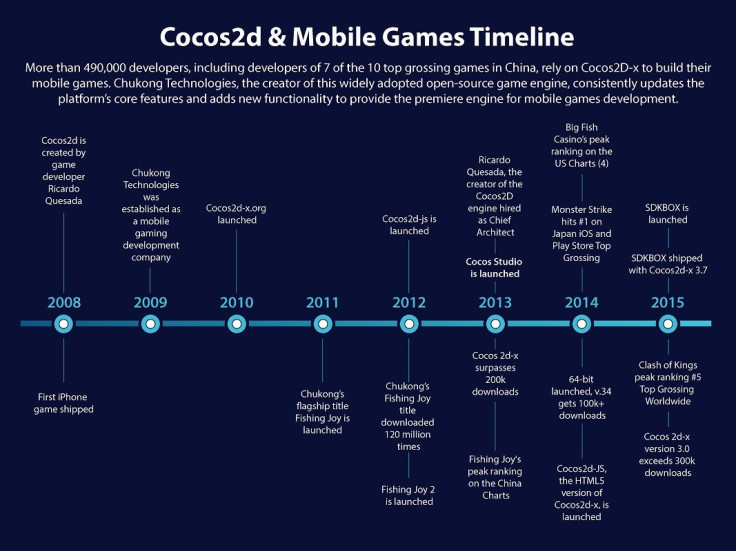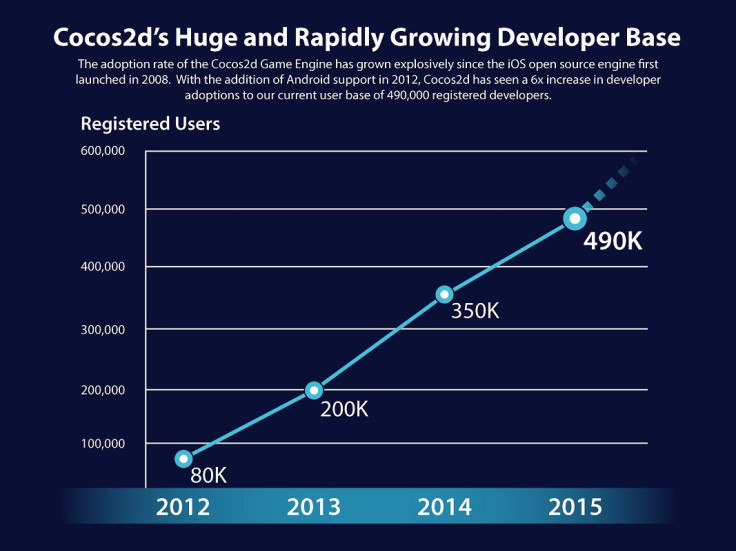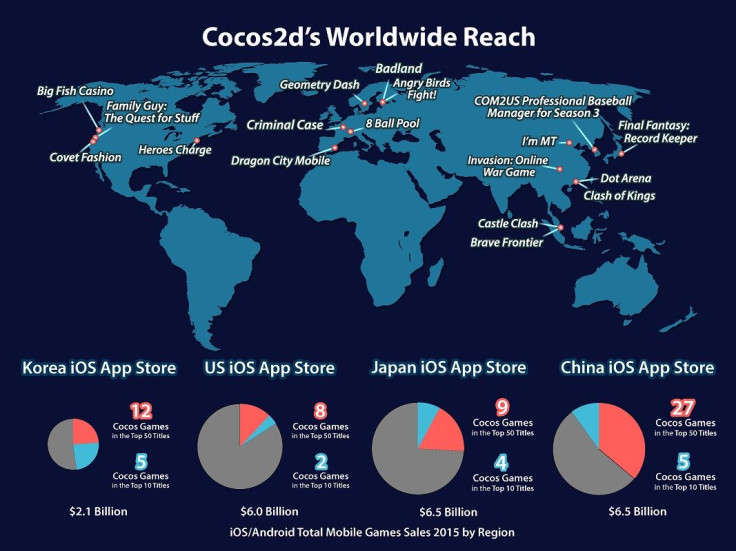Over the last couple of years, the Unity engine has become one of the most ubiquitous development platforms in gaming, thanks to the engine's extensive multi-platform support. But a new player out of China is hoping it can carve a slice out of Unity's market share in the West.
Western gamers may not be familiar with Chukong USA or its parent company, Chukong Technologies; however, the organization has already established a significant foothold in China. Only four-and-a-half years removed from the debut of its marquee title, Fishing Joy, Chukong now employs more than 1000 people. Cocos has been used to create more than 60,000 applications and Chukong says the engine is behind 50 percent of China's highest-grossing games. The company also acts as publisher for local devs, as well as international teams hoping to break into the highly-competitive Chinese market. And those successes are generating more than $200 million in annual revenues for Chukong Technologies.
Unfortunately, success in China hasn't translated into a burgeoning operation stateside. Older versions of the Cocos engine were used to create several mobile titles, including Family Guy: The Quest for Stuff and Big Fish Casino, but an overall lack of interest convinced the company to put the brakes on its North American efforts. But Chukong is ready to take another stab at the Western market, armed with its new live operations platform, SDKBOX v1.3.
iDigitalTimes spoke with Kai Zhao, general manager for Chukong USA, and Davey Jackson, the company's vice president of business development, about SDKBOX, how the company's live operations platform will simplify Cocos2d-x development and Chukong's plans for beating Unity in the Western market.

Recognizing that closed platforms sometimes outperform their open-source counterparts, at least at the digital cash register, Chukong hopes SDKBOX -- a platform of services all pre-certified to work with one another and Cocos2d-x -- can become the Swiss army knife of mobile game development. These days, developers use third-party software development kits (SDKs) for everything from advertisements to social networking and user retention. But adding those services to an existing project, particularly those that incorporate multiple backend services, can be both frustrating and time-consuming.
Smaller studios frequently don’t have the manpower to deal with the headaches that accompany an open-source platform – particularly when trying to resolve service compatibility issues – and it’s those companies that Chukong USA believes can benefit most from using the SDKBOX. The idea is to reduce the amount of time developers waste trying to make the various backend services in their game(s) play nicely with one another. Rather than rely on promises of compatibility, and/or the malleable nature of an open-source engine like Cocos2d-x, Chukong hopes SDKBOX will expedite the process of finding and integrating services with projects build in Cocos2d-x.
“For small to medium-sized companies, SDKBOX is going to be a crucial piece for them,” Zhao told iDigi. “They may not have the dedicated resources to deal with service integration, upgrading the SDK, debugging and all those issues. The SDKBOX will reduce their development costs by a large chunk."
Finding compatible backend services has become a significant problem for game developers. Zhao says the average mobile game now includes between 5 and 15 SDKs. While there aren't any official numbers on the matter, the estimate isn't far from the 10 kit-per-app figure offered by Twin Prime in September or a similar estimate from Seasun Inc. senior project manager Mantin Lu back in June. And that's a major time sink for developers, even those employed by studios with engineers dedicated to the task.
"I think we're an efficiency boost for larger studios," Jackson said. "But the place where SDKBOX is really going to shine is for small and mid-size companies that don't have robust live operations platforms yet. That don't have the manpower, internally, to put engineers just on that problem."

At present, Chukong sees the Unity engine as one its biggest obstacles in Western markets. The two companies are effectively mirror images of one another; Chukong with the lion's share of the Chinese market while Unity remains much bigger in Europe and the Americas. But the executives I spoke with believe the Unity engine's biggest perceived strength --its extensive multi-platform support -- could give Chukong an opening.
The Unity engine made a name for itself as a PC, mobile and console-friendly development solution that makes it easy for studios to release their games on a wide variety of platforms. These days, the engine's website touts users' ability to deploy a single project to 23 different platforms. But Chukong remains focused almost entirely on the mobile market. The company offers some tools, for porting Cocos2d-x projects to PC/Mac/Linux; however, their development isn't a priority for Chukong. And the SDKBOX is being created explicitly for the mobile space, a fact Zhao highlighted in a recent chat with VentureBeat.
"To succeed in mobile today, you have to be able to choose from the best live operations service partners," Zhao told the site."Not just from the ones pre-selected by your engine maker."
Six new companies were added to the list of certified SDKBOX providers, just this month; including Fyber, Bee7, ValuePotion and SOOMLA Grow. The providers offer a variety of solutions, from mobile payments to user analytics, and the influx of new services nearly doubles the current list of services available to SDKBOX users. And the platform has only been available since May.

Jackson says Chukong USA also takes a notably different approach to the business of service integration. Competitors, like Unity, typically shepherd users toward a specific set of third-party tools. In many cases, they're internally owned/operated services, acting as secondary revenue streams for the engine's creators. But Cocos2d-x is open-source and Chukong will be working to make the engine compatible with as many outside service providers as possible. In fact, the vice president says Chukong's goal is to "cover as many categories as possible.”
“We’re offering a truly democratic offering for post-launch services,” Jackson told iDigitalTimes. “Where Unity is trying to funnel you into Unity properties, we’re making it so that the industry’s leading services are pre-certified, integrated and all ready to go with Cocos. With Unity ... you can use their plug-in architecture ... but they’re not putting their brand behind the quality of that integration.”
Chukong USA's general manager says regular communication and a deep understanding of the mobile development landscape all give them a leg up on the competition. Chukong has published more than 60 internally-developed mobile games, including Fishing Joy, and that development experience gives the company a thorough understanding of the problems facing mobile developers.
“We’re closer to the developers and their needs,” Zhao adds. “Unity tends to promote [its own] services. SDKBOX is a neutral platform and we work with all the service providers…to help them get closer to the developers and lower the barriers for developers to use those services.”
Those interested in learning more about the Cocos2d-x game engine and/or Chukong's recently released SDKBOX platform can find additional information on the Cocos2d-X website. Additional information on Chukong USA and/or Chukong Technologies can be found on the company's website.


















